
The Federal Meat Inspection Act of 1906 (FMIA) is an American law that makes it illegal to adulterate or misbrand meat and meat products being sold as food, and ensures that meat and meat products are slaughtered and processed under strictly regulated sanitary conditions. These requirements also apply to imported meat products, which must be inspected under equivalent foreign standards. United States Department of Agriculture (USDA) inspection of poultry was added by the Poultry Products Inspection Act of 1957 (PPIA). The Food, Drug, and Cosmetic Act authorizes the Food and Drug Administration (FDA) to provide inspection services for all livestock and poultry species not listed in the FMIA or PPIA, including venison and buffalo. The Agricultural Marketing Act authorizes the USDA to offer voluntary, fee-for-service inspection services for these same species.

The United States Department of Agriculture (USDA) is an executive department of the United States federal government that aims to meet the needs of commercial farming and livestock food production, promotes agricultural trade and production, works to assure food safety, protects natural resources, fosters rural communities and works to end hunger in the United States and internationally. It is headed by the secretary of agriculture, who reports directly to the president of the United States and is a member of the president's Cabinet. The current secretary is Tom Vilsack, who has served since February 24, 2021.
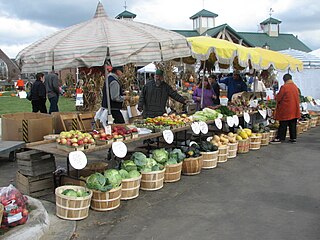
A farmers' market is a physical retail marketplace intended to sell foods directly by farmers to consumers. Farmers' markets may be indoors or outdoors and typically consist of booths, tables or stands where farmers sell their produce, live animals and plants, and sometimes prepared foods and beverages. Farmers' markets exist in many countries worldwide and reflect the local culture and economy. The size of the market may be just a few stalls or it may be as large as several city blocks. Due to their nature, they tend to be less rigidly regulated than retail produce shops.
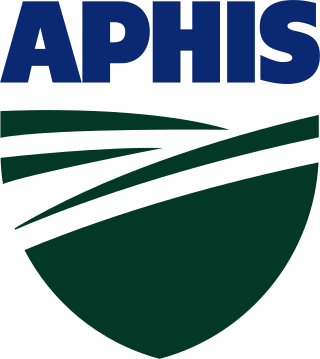
The Animal and Plant Health Inspection Service (APHIS) is an agency of the United States Department of Agriculture (USDA) based in Riverdale, Maryland responsible for protecting animal health, animal welfare, and plant health. APHIS is the lead agency for collaboration with other agencies to protect U.S. agriculture from invasive pests and diseases. APHIS's PPQ is the National Plant Protection Organization for the U.S., and the agency's head of veterinary services/veterinary Deputy Administrator is the Chief Veterinary Officer of the United States.

Free range denotes a method of farming husbandry where the animals, for at least part of the day, can roam freely outdoors, rather than being confined in an enclosure for 24 hours each day. On many farms, the outdoors ranging area is fenced, thereby technically making this an enclosure, however, free range systems usually offer the opportunity for the extensive locomotion and sunlight that is otherwise prevented by indoor housing systems. Free range may apply to meat, eggs or dairy farming.
The Agricultural Marketing Service (AMS) is an agency of the United States Department of Agriculture; it maintains programs in five commodity areas: cotton and tobacco; dairy; fruit and vegetable; livestock and seed; and poultry. These programs provide testing, standardization, grading and market news services for those commodities, and oversee marketing agreements and orders, administer research and promotion programs, and purchase commodities for federal food programs. The AMS enforces certain federal laws such as the Perishable Agricultural Commodities Act and the Federal Seed Act. The AMS budget is $1.2 billion. It is headquartered in the Jamie L. Whitten Building in Washington, D.C.

JBS USA Holdings, Inc. is a meat processing company and a wholly owned subsidiary of the Brazilian multinational JBS S.A. The subsidiary was created when JBS entered the U.S. market in 2007 with its purchase of Swift & Company.
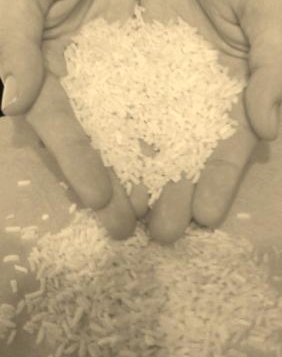
Food policy is the area of public policy concerning how food is produced, processed, distributed, purchased, or provided. Food policies are designed to influence the operation of the food and agriculture system balanced with ensuring human health needs. This often includes decision-making around production and processing techniques, marketing, availability, utilization, and consumption of food, in the interest of meeting or furthering social objectives. Food policy can be promulgated on any level, from local to global, and by a government agency, business, or organization. Food policymakers engage in activities such as regulation of food-related industries, establishing eligibility standards for food assistance programs for the poor, ensuring safety of the food supply, food labeling, and even the qualifications of a product to be considered organic.

The Under Secretary for Marketing and Regulatory Programs is a high-ranking position within the United States Department of Agriculture that supervises policy development and day-to-day operations of the Animal and Plant Health Inspection Service, the Agricultural Marketing Service, and the Grain Inspection, Packers, and Stockyards Administration. The three agencies were appropriated over $800 million by Congress in fiscal year 2004.

The Packers and Stockyards Act of 1921 regulates meatpacking, livestock dealers, market agencies, live poultry dealers, and swine contractors to prohibit unfair or deceptive practices, giving undue preferences, apportioning supply, manipulating prices, or creating a monopoly. It was enacted following the release in 1919 of the Report of the Federal Trade Commission on the meatpacking industry.

Food safety is used as a scientific method/discipline describing handling, preparation, and storage of food in ways that prevent foodborne illness. The occurrence of two or more cases of a similar illness resulting from the ingestion of a common food is known as a food-borne disease outbreak. This includes a number of routines that should be followed to avoid potential health hazards. In this way, food safety often overlaps with food defense to prevent harm to consumers. The tracks within this line of thought are safety between industry and the market and then between the market and the consumer. In considering industry-to-market practices, food safety considerations include the origins of food including the practices relating to food labeling, food hygiene, food additives and pesticide residues, as well as policies on biotechnology and food and guidelines for the management of governmental import and export inspection and certification systems for foods. In considering market-to-consumer practices, the usual thought is that food ought to be safe in the market and the concern is safe delivery and preparation of the food for the consumer. Food safety, nutrition and food security are closely related. Unhealthy food creates a cycle of disease and malnutrition that affects infants and adults as well.

Intensive animal farming, industrial livestock production, and macro-farms, also known as factory farming, is a type of intensive agriculture, specifically an approach to animal husbandry designed to maximize production while minimizing costs. To achieve this, agribusinesses keep livestock such as cattle, poultry, and fish at high stocking densities, at large scale, and using modern machinery, biotechnology, and global trade. The main products of this industry are meat, milk and eggs for human consumption.
President Chester A. Arthur signed the Animal Industry Act on May 29, 1884 creating the Bureau of Animal Industry (BAI), an organization that was established under the United States Department of Agriculture. It replaced the Veterinary Division that had been created by the Commissioner of Agriculture in 1883, which had taken over for the Treasury Cattle Commission, Department of Treasury.
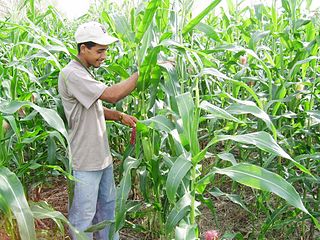
Agriculture in Panama is an important sector of the Panamanian economy. Major agricultural products include bananas, cocoa beans, coffee, coconuts, timber, beef, chicken, shrimp, corn, potatoes, rice, soybeans, and sugar cane.
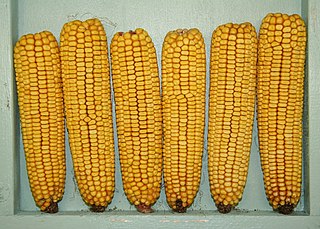
Dent corn, also known as grain corn, is a type of field corn with a high soft starch content. It received its name because of the small indentation, or "dent", at the crown of each kernel on a ripe ear of corn. Reid's Yellow Dent is a variety developed by central Illinois farmer James L. Reid. Reid and his father, Robert Reid, moved from Brown County, Ohio, to Tazewell County, Illinois, in 1846 bringing with them a red corn variety known as "Johnny Hopkins", and crossed it with varieties of flint corn and flour corn. Most of today's hybrid corn varieties and cultivars are derived from it. This variety won a prize at the 1893 World's Fair.

The Agricultural Fair Practices Act of 1967 was enacted to protect farmers from retaliation by handlers because the farmers are members of a cooperative. The act permits farmers to file complaints with USDA, which can then institute court proceedings, if they believe their rights under the law have been violated. Several bills have been introduced in recent years on behalf of producers to give them more bargaining power under the Act, which, some producers contend, lacks adequate enforcement authorities.

The United States Grain Standards Act (USGSA) of 1916, as amended, authorizes the Grain Inspection, Packers and Stockyards Administration to establish official marketing standards for grains and oilseeds, and requires that exported grains and oilseeds be officially weighed and inspected. Domestically marketed grain and oilseeds may be, but are not required to be, officially inspected. Export inspections are carried out by federal inspectors or by federally supervised state inspection agencies, called delegated official inspection agencies. Official inspections of domestically traded grain is done by federally supervised state agencies and private companies, called designated official inspection agencies. Typically, marketing standards describe the physical characteristics of the commodity and serve as contract language to facilitate marketing. Official weighing and inspection is paid for on a fee-for service basis, not with federal funds. Major changes to the law were adopted in the USGSA Amendments of 1968, the USGSA of 1976, and the Grain Quality Improvement Act of 1986.
The Organic Foods Production Act of 1990 (OFPA) authorizes a National Organic Program (NOP) to be administered by USDA's Agricultural Marketing Service (AMS). The program is based on federal regulations that define standard organic farming practices and on a National List of acceptable organic production inputs. Private and state certifiers visit producers, processors, and handlers to certify that their operations abide by the standards. Once certified, these operations may affix the USDA Organic Seal. USDA has established four distinct categories for labeling organic products—100 percent organic, organic, "made with" organic ingredients, and specific organic ingredients—and only 100 percent organic and organic categories can use the USDA Organic Seal. It is illegal for anyone to use the word "organic" on a product if it does not meet the standards set in the law and regulations. The regulations under the OFPA are intended to set uniform minimum standards for organic production. However, states may adopt additional requirements after review and approval by USDA. AMS re-accredits certifying agents every 5 years, maintains federal oversight to assure truth in labeling, and provides assurance that imported organic products have been produced under standards that are equivalent to the U.S. standards.

The Food Safety and Inspection Service (FSIS), an agency of the United States Department of Agriculture (USDA), is the public health regulatory agency responsible for ensuring that United States' commercial supply of meat, poultry, and egg products is safe, wholesome, and correctly labeled and packaged. The FSIS draws its authority from the Federal Meat Inspection Act of 1906, the Poultry Products Inspection Act of 1957 and the Egg Products Inspection Act of 1970.
Antibiotic use in the United States poultry farming industry is the controversial prophylactic use of antibiotics in the country's poultry farming industry. It differs from the common practice in Europe, where antibiotics for growth promotion were disallowed in the 1950s.














